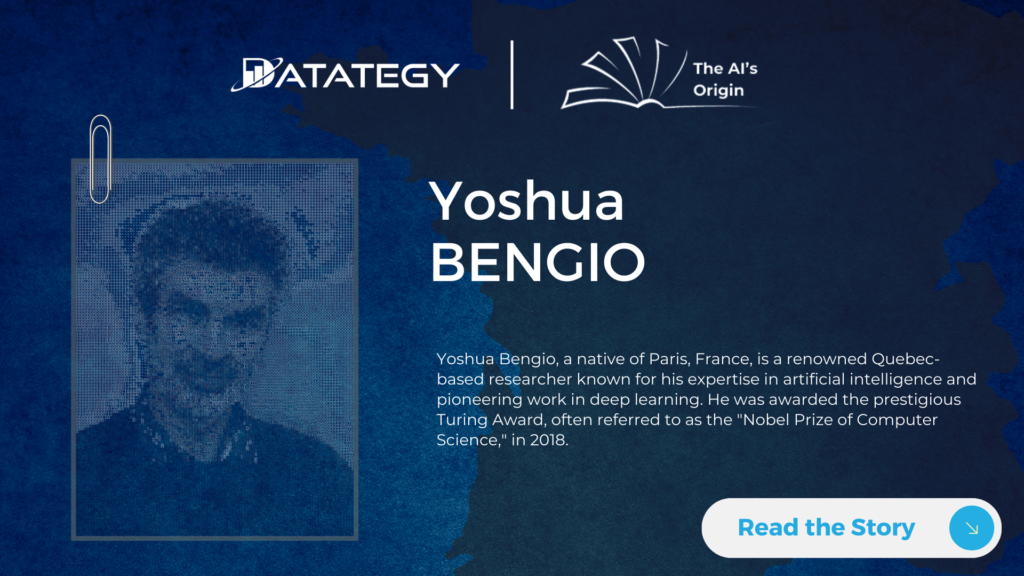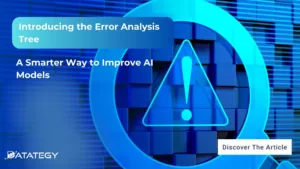Scaling RAG Systems in Financial Organizations Artificial intelligence has emerged...
Read MoreThe AI's Origin: Yoshua BENGIO
Table of Contents
ToggleGreetings from the “The AI’s Origin” series. In this collection of articles, we take you on a motivational trip through the development of artificial intelligence, highlighting the extraordinary people who have made a significant contribution to democratizing AI.
We’ll delve into the lives and accomplishments of these creative minds who have changed the AI landscape to create a more inclusive and transformational future across these pieces. Join us as we recognize the incredible people who have fueled the AI revolution and examine the human creativity that has made it all possible.

Yoshua BENGIO is a distinguished researcher in the field of artificial intelligence (AI) and an influential figure in the realm of deep learning. Born in Paris, France, his work has significantly contributed to the advancement of AI technology. In recognition of his remarkable contributions, he was honored with the Turing Award in 2018, widely regarded as the pinnacle of achievement in the field of computer science. With an extensive background in AI research, he continues to be a prominent figure in shaping the future of AI and machine learning.
Key Dates About Yoshua BENGIO
| Date | Event |
|---|---|
| 1964 | Born in Paris, France |
| 1993 | Received his Ph.D. in Computer Science from McGill University |
| 2000 | Founded the Montreal Institute for Learning Algorithms (MILA) |
| 2017 | Elected a Fellow of the Royal Society of Canada |
| 2018 | Received the Turing Award, Nobel Prize in Computer Science |
| Present | Continues to be a prominent figure in AI research and education |
Yoshua Bengio's Transformative Impact on Computer Vision
Deep learning has benefited greatly from Yoshua BENGIO’s discoveries, notably the use of Convolutional Neural Networks (CNNs) for computer vision. His innovative work in this area has significantly improved object and picture recognition. Bengio’s research has made it possible for robots to accurately interpret and comprehend visual material by leveraging the power of CNNs. This ground-breaking study has transformed how we interact with and understand visual data with applications in a variety of fields, including autonomous cars and healthcare. His foresight and commitment unlocked new opportunities for computer vision and image analysis, leaving a lasting impression on the area of artificial intelligence.
Key Benefits of Convolutional Neural Networks (CNNs) in Computer Vision
| Benefit | Description |
|---|---|
| Improved Image Recognition | CNNs enable more accurate and efficient image recognition, surpassing human capabilities in certain tasks. |
| Object Detection | CNNs have revolutionized object detection by allowing systems to locate and identify objects within images. |
| Feature Extraction | They automatically learn and extract relevant features from images, reducing manual feature engineering. |
| Robustness to Variations | CNNs can handle variations in scale, orientation, lighting, and more, making them versatile for different conditions. |
| Deep Learning Integration | They are a fundamental part of deep learning architectures, facilitating complex tasks in computer vision. |
| Reduced Computational Load | CNNs optimize the use of computational resources, making real-time processing feasible in many applications. |
Interested in discovering papAI
Our team of AI experts will be happy to answer any questions you may have.
How AgenticAI is Transforming Sales and Marketing Strategies
How AgenticAI is Transforming Sales and Marketing Strategies Agentic AI...
Read More“DATATEGY EARLY CAREERS PROGRAM” With Abdelmoumen ATMANI
“DATATEGY EARLY CAREERS PROGRAM” With Abdelmoumen ATMANI Hello, my name...
Read MoreIntroducing the Error Analysis Tree: A Smarter Way to Improve AI Models
Introducing the Error Analysis Tree: A Smarter Way to Improve...
Read More


